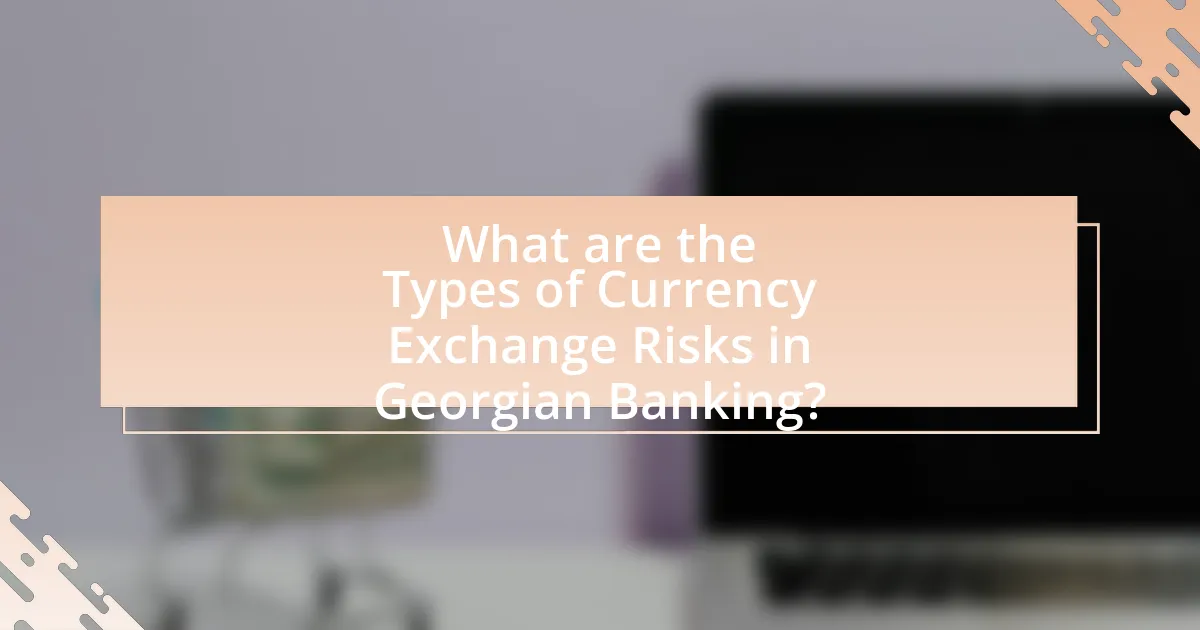Currency exchange risks in Georgian banking investments refer to the potential financial losses that investors may face due to fluctuations in currency exchange rates, particularly involving the Georgian Lari. This article examines how these risks impact investment decisions, influenced by factors such as economic instability, geopolitical tensions, and foreign investment fluctuations. It outlines the types of currency exchange risks, including transaction, translation, and economic risks, and discusses strategies for mitigating these risks, such as hedging and diversification. Additionally, the article highlights the importance of understanding currency exchange trends and the role of international relations in currency stability, providing insights for investors navigating the Georgian market.

What are Currency Exchange Risks in Georgian Banking Investments?
Currency exchange risks in Georgian banking investments refer to the potential financial losses that investors may incur due to fluctuations in currency exchange rates. These risks arise when investments are denominated in foreign currencies, making them susceptible to changes in the value of the Georgian Lari against other currencies. For instance, if an investor holds assets in euros and the Lari depreciates against the euro, the value of those assets in Lari terms decreases, leading to potential losses. Historical data indicates that the Georgian Lari has experienced significant volatility, which underscores the importance of understanding these risks for effective investment strategies in Georgia’s banking sector.
How do currency exchange risks impact investment decisions in Georgia?
Currency exchange risks significantly impact investment decisions in Georgia by influencing the profitability and stability of investments. Investors in Georgia face potential losses due to fluctuations in currency values, particularly since the Georgian Lari is subject to volatility against major currencies like the Euro and US Dollar. For instance, a depreciation of the Lari can reduce the returns on investments denominated in foreign currencies, making them less attractive. Additionally, businesses that rely on imports or exports may adjust their investment strategies based on anticipated currency movements, leading to a more cautious approach in capital allocation. This risk is underscored by historical data showing that currency fluctuations can lead to substantial financial losses, thereby affecting overall investor confidence and market stability in Georgia.
What factors contribute to currency exchange risks in the Georgian market?
Currency exchange risks in the Georgian market are primarily influenced by economic instability, geopolitical tensions, and fluctuations in foreign investment. Economic instability, characterized by high inflation rates and fluctuating GDP growth, can lead to depreciation of the Georgian Lari, increasing exchange risks for investors. Geopolitical tensions, particularly in relation to neighboring countries, can create uncertainty, affecting investor confidence and currency stability. Additionally, fluctuations in foreign investment, driven by global market conditions and investor sentiment, can lead to volatility in currency exchange rates, further contributing to the risks faced by investors in the Georgian market.
How do fluctuations in currency value affect returns on investments?
Fluctuations in currency value directly impact returns on investments by altering the effective value of foreign assets when converted back to the investor’s home currency. For instance, if an investor holds assets in a foreign currency that depreciates against their home currency, the returns realized upon conversion will be lower than expected. Historical data shows that during the 2008 financial crisis, the depreciation of the Euro against the US Dollar led to significant losses for investors holding Euro-denominated assets, as their returns diminished when converted back to Dollars. This illustrates how currency volatility can erode investment gains or amplify losses, emphasizing the importance of considering exchange rate risks in investment strategies.
Why is understanding currency exchange risks crucial for investors?
Understanding currency exchange risks is crucial for investors because fluctuations in exchange rates can significantly impact the value of their investments. For instance, if an investor holds assets in a foreign currency and that currency depreciates against their home currency, the value of their investment decreases when converted back. Historical data shows that between 2010 and 2020, the Euro fluctuated by over 20% against the US dollar, illustrating the potential volatility investors face. Therefore, recognizing these risks allows investors to make informed decisions, hedge against potential losses, and optimize their investment strategies in the context of global markets.
What are the potential consequences of ignoring currency exchange risks?
Ignoring currency exchange risks can lead to significant financial losses for businesses and investors. When currency fluctuations occur, the value of foreign investments can decrease, resulting in reduced profit margins or even losses. For instance, a company that operates internationally may find that its revenues in foreign currencies translate to lower amounts in its home currency due to unfavorable exchange rates. This can impact cash flow and overall financial stability. Additionally, failure to hedge against currency risks can lead to increased volatility in earnings, making it difficult for companies to forecast and plan for future financial performance. Historical data shows that companies exposed to currency risks without proper management strategies have faced substantial declines in market value, underscoring the importance of addressing these risks proactively.
How can investors mitigate the impact of currency exchange risks?
Investors can mitigate the impact of currency exchange risks by employing hedging strategies, such as using forward contracts, options, and currency swaps. These financial instruments allow investors to lock in exchange rates for future transactions, thereby reducing uncertainty and potential losses due to currency fluctuations. For instance, a study by the Bank for International Settlements indicates that companies utilizing hedging strategies can reduce their exposure to currency risk by up to 50%. Additionally, diversifying investments across multiple currencies can further minimize risk, as it spreads exposure and reduces reliance on any single currency’s performance.

What are the Types of Currency Exchange Risks in Georgian Banking?
The types of currency exchange risks in Georgian banking include transaction risk, translation risk, and economic risk. Transaction risk arises from the fluctuations in exchange rates between the time a transaction is initiated and when it is settled, potentially leading to financial losses. Translation risk affects the financial statements of banks when converting foreign currency assets and liabilities into Georgian Lari, impacting reported earnings and equity. Economic risk, also known as operating risk, refers to the long-term impact of exchange rate changes on a bank’s market position and competitiveness, which can affect future cash flows and profitability. These risks are critical for Georgian banks, especially given the country’s reliance on foreign investments and trade.
What are the main categories of currency exchange risks?
The main categories of currency exchange risks are transaction risk, translation risk, and economic risk. Transaction risk arises from the time delay between entering into a contract and settling it, which can lead to losses due to fluctuating exchange rates. Translation risk, also known as accounting risk, occurs when a company has assets or liabilities denominated in foreign currencies, affecting financial statements when converted to the home currency. Economic risk refers to the impact of exchange rate fluctuations on a company’s market value and competitive position, influenced by broader economic factors. These categories are critical for businesses engaged in international trade or investments, as they can significantly affect profitability and financial stability.
How does transaction risk differ from translation risk?
Transaction risk refers to the potential for losses due to fluctuations in exchange rates between the time a transaction is initiated and when it is settled, impacting cash flows directly. In contrast, translation risk arises from the need to convert financial statements of foreign subsidiaries into the parent company’s reporting currency, affecting the reported earnings and asset values without impacting cash flows directly. For instance, if a Georgian bank has a subsidiary in the Eurozone, any changes in the Euro to Georgian Lari exchange rate will affect the value of the subsidiary’s assets when consolidated into the bank’s financial statements, illustrating translation risk. Thus, while transaction risk affects actual cash transactions, translation risk impacts the accounting representation of those transactions.
What is economic risk and how does it affect Georgian investments?
Economic risk refers to the potential for financial loss due to changes in the economic environment, including factors such as inflation, interest rates, and currency fluctuations. In the context of Georgian investments, economic risk can significantly impact investor confidence and the stability of returns, as Georgia’s economy is influenced by external factors like global market trends and regional geopolitical issues. For instance, fluctuations in the Georgian lari against major currencies can affect the profitability of investments, particularly for foreign investors. Additionally, economic instability can lead to higher borrowing costs and reduced access to capital, further complicating investment conditions in Georgia.
How do geopolitical factors influence currency exchange risks in Georgia?
Geopolitical factors significantly influence currency exchange risks in Georgia by affecting investor confidence and economic stability. The ongoing tensions with Russia, particularly since the 2008 war and the annexation of Crimea in 2014, have created an environment of uncertainty that impacts the Georgian lari’s value against major currencies. For instance, fluctuations in the lari can be attributed to geopolitical events, such as military conflicts or diplomatic relations, which directly affect trade and investment flows. Additionally, Georgia’s strategic location as a transit route for energy resources heightens its vulnerability to regional geopolitical dynamics, further exacerbating currency volatility.
What role do international relations play in currency stability?
International relations significantly influence currency stability by affecting investor confidence, trade balances, and economic policies. Strong diplomatic ties and trade agreements can lead to increased foreign investment, which bolsters a country’s currency value. For instance, the stability of the Eurozone is partly attributed to the European Union’s collaborative economic policies and mutual support among member states. Conversely, geopolitical tensions, such as sanctions or conflicts, can lead to currency depreciation, as seen in the case of the Russian ruble during international sanctions imposed in 2014. Thus, the dynamics of international relations directly correlate with the fluctuations in currency stability, impacting economic performance and investment attractiveness.
How can political instability impact currency exchange rates?
Political instability can lead to significant fluctuations in currency exchange rates. When a country experiences political turmoil, such as protests, government changes, or conflict, investor confidence typically declines, resulting in capital flight. For instance, during the 2014 Ukrainian crisis, the Ukrainian hryvnia depreciated sharply against major currencies due to uncertainty and instability, losing over 50% of its value within a year. This decline in confidence can cause a decrease in demand for the affected currency, further exacerbating its depreciation. Additionally, political instability often leads to economic sanctions or reduced foreign investment, which can negatively impact a country’s economic outlook and, consequently, its currency value.

What Strategies Can Investors Use to Manage Currency Exchange Risks?
Investors can manage currency exchange risks through several strategies, including hedging, diversification, and using currency-hedged investment vehicles. Hedging involves using financial instruments such as options or futures contracts to offset potential losses from currency fluctuations. For example, if an investor anticipates a decline in the value of a foreign currency, they can enter into a futures contract to sell that currency at a predetermined rate, thus locking in their exchange rate and mitigating risk.
Diversification across different currencies and geographic regions can also reduce exposure to any single currency’s volatility. By spreading investments across various currencies, investors can minimize the impact of adverse movements in one currency on their overall portfolio.
Additionally, currency-hedged investment vehicles, such as mutual funds or exchange-traded funds (ETFs) that specifically aim to mitigate currency risk, provide a practical option for investors. These funds typically use derivatives to hedge against currency fluctuations, allowing investors to focus on the underlying asset’s performance without worrying about currency risk.
These strategies are supported by historical data showing that effective hedging can significantly reduce the impact of currency volatility on investment returns, as evidenced by studies from financial institutions that highlight the benefits of hedging in volatile markets.
What are effective hedging techniques for Georgian investments?
Effective hedging techniques for Georgian investments include the use of currency forwards, options, and swaps. Currency forwards allow investors to lock in exchange rates for future transactions, mitigating the risk of currency fluctuations. Options provide the right, but not the obligation, to exchange currency at a predetermined rate, offering flexibility in volatile markets. Swaps enable the exchange of cash flows in different currencies, which can help manage exposure to currency risk. These techniques are particularly relevant given Georgia’s economic ties to the Euro and US Dollar, where fluctuations can significantly impact investment returns.
How can forward contracts be utilized to mitigate risks?
Forward contracts can be utilized to mitigate risks by locking in exchange rates for future transactions, thereby protecting against adverse currency fluctuations. This financial instrument allows businesses and investors to set a predetermined rate for buying or selling a currency at a future date, which eliminates uncertainty related to exchange rate volatility. For instance, if a Georgian bank anticipates receiving payments in a foreign currency, it can enter into a forward contract to secure the current exchange rate, ensuring that the value of those payments remains stable regardless of market changes. This strategy is particularly relevant in environments with high currency risk, as it provides a safeguard against potential losses that could arise from unfavorable shifts in exchange rates.
What role do options play in managing currency exchange risks?
Options serve as financial instruments that provide the right, but not the obligation, to exchange currencies at a predetermined rate, thereby effectively managing currency exchange risks. By utilizing options, investors can hedge against unfavorable currency movements, ensuring that they can lock in exchange rates and protect their investments from volatility. For instance, if a Georgian bank anticipates a depreciation of the lari against the euro, it can purchase a euro call option, allowing it to buy euros at a fixed rate, thus mitigating potential losses from adverse currency fluctuations. This strategy is particularly relevant in the context of Georgian banking investments, where currency risk can significantly impact returns.
How can diversification help in reducing currency exchange risks?
Diversification can help in reducing currency exchange risks by spreading investments across multiple currencies, thereby minimizing the impact of adverse fluctuations in any single currency. When an investor holds assets in various currencies, the negative performance of one currency can be offset by the stability or positive performance of others. For example, if an investor has assets in both the Euro and the US Dollar, a decline in the Euro’s value may be balanced by a rise in the US Dollar, reducing overall risk exposure. Historical data shows that diversified portfolios tend to exhibit lower volatility compared to concentrated investments, as evidenced by studies indicating that diversification can reduce risk by up to 30% in currency-related investments.
What types of assets should investors consider for diversification?
Investors should consider a mix of equities, fixed income securities, real estate, commodities, and alternative investments for diversification. Equities provide growth potential, while fixed income securities offer stability and income. Real estate can serve as a hedge against inflation, and commodities like gold can protect against currency fluctuations. Alternative investments, such as hedge funds or private equity, can further reduce risk through non-correlated returns. Historical data shows that a diversified portfolio can reduce volatility and improve risk-adjusted returns, as evidenced by studies indicating that diversification can lower portfolio risk by up to 30%.
How does geographic diversification impact currency risk exposure?
Geographic diversification reduces currency risk exposure by spreading investments across multiple currencies, which mitigates the impact of adverse currency fluctuations in any single market. When a company operates in various countries, it earns revenues in different currencies, allowing it to offset losses in one currency with gains in another. For instance, if the Euro depreciates against the Dollar, a company with operations in both regions may find that its Dollar revenues increase, balancing the overall financial impact. Studies have shown that firms with diversified geographic operations experience lower volatility in earnings due to currency movements, as evidenced by research from the International Monetary Fund, which highlights that diversified firms are better positioned to withstand currency shocks.
What best practices should investors follow to navigate currency exchange risks?
Investors should employ hedging strategies to effectively navigate currency exchange risks. Hedging can involve using financial instruments such as options, futures, or forward contracts to protect against unfavorable currency movements. For instance, a study by the Bank for International Settlements indicates that companies utilizing hedging strategies can reduce their exposure to currency fluctuations by up to 50%. Additionally, diversifying investments across multiple currencies can mitigate risks, as it spreads exposure and reduces the impact of adverse movements in any single currency. Implementing these best practices allows investors to manage currency exchange risks more effectively in the context of Georgian banking investments.
How can regular market analysis improve investment strategies?
Regular market analysis enhances investment strategies by providing timely insights into market trends, economic indicators, and currency fluctuations. This continuous evaluation allows investors to make informed decisions, adjust their portfolios, and mitigate risks associated with currency exchange, particularly in volatile markets like Georgia. For instance, understanding the correlation between local economic performance and currency value can lead to strategic asset allocation, ultimately improving returns and reducing potential losses.
What resources are available for understanding currency exchange trends?
Resources available for understanding currency exchange trends include financial news websites, economic research reports, and currency exchange platforms. Financial news websites like Bloomberg and Reuters provide real-time updates and analysis on currency fluctuations. Economic research reports from institutions such as the International Monetary Fund (IMF) and World Bank offer in-depth studies on macroeconomic factors influencing currency values. Additionally, currency exchange platforms like XE and OANDA provide historical data and trend analysis tools that help users track exchange rate movements over time. These resources collectively enhance the understanding of currency exchange trends, particularly in the context of Georgian banking investments.